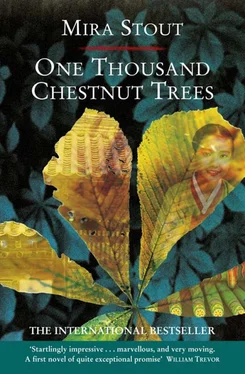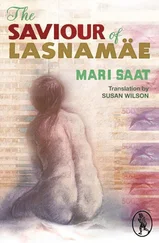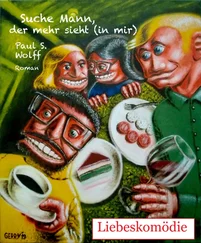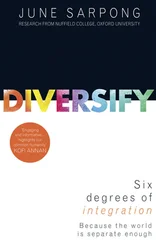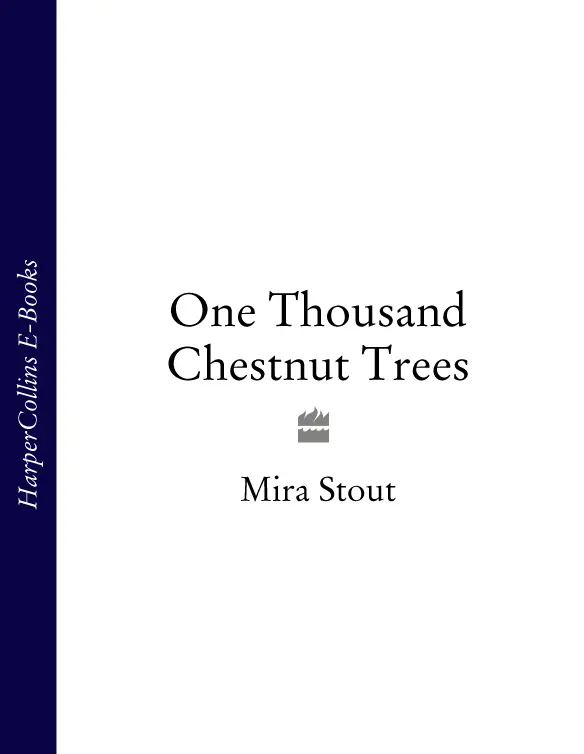
MIRA STOUT
One Thousand Chestnut Trees

DEDICATION CONTENTS Cover Title Page Dedication PART ONE Daughter 1 A Memory 2 Cardboard Boxes 3 Five Martinis 4 History PART TWO Mother 5 Et in Arcadia Ego 6 Father Goes Away Grandfather 7 Mansei Mother 8 School Days 9 A Radio Broadcast 10 Namsan Park 11 Fire on the Cliff 12 Ninety Thousand Troops 13 In Hiding 14 Airbase 15 Farewell PART THREE Daughter 16 Kimpo Revisited 17 Going South 18 Going North 19 Filial Piety 20 Yangyang 21 One Thousand Chestnut Trees Acknowledgements About the Author Praise Copyright About the Publisher
FOR MY MOTHER AND FATHER, AND THE KOH FAMILY.
Cover
Title Page MIRA STOUT
Dedication
| PART ONE |
Daughter PART ONE Daughter |
1 A Memory
2 Cardboard Boxes
3 Five Martinis
4 History
| PART TWO |
Mother PART TWO Mother |
5 Et in Arcadia Ego
6 Father Goes Away
7 Mansei
8 School Days
9 A Radio Broadcast
10 Namsan Park
11 Fire on the Cliff
12 Ninety Thousand Troops
13 In Hiding
14 Airbase
15 Farewell
16 Kimpo Revisited
17 Going South
18 Going North
19 Filial Piety
20 Yangyang
21 One Thousand Chestnut Trees
Acknowledgements
About the Author
Praise
Copyright
About the Publisher
PART ONE Daughter
It was winter in Vermont. Beyond my window, the pines would have bristled sparsely against the hushed white snow. The grey, swelling sky would have been as vast and lonely as a Northern sea. But I can’t recall Hong-do’s arrival. His presence was ghostly then, so tentative that he scarcely left an imprint. Yet now, years later, when I remember that emptiness, Hong-do’s face follows.
My uncle from Seoul came to stay with us when I was just fourteen, my first year of boarding school. His jet eyes, wide-boned pallor, and shock-hair gave him an outward boldness, but he was actually quite shy. Although I’d met my mother’s Korean friends, Hong-do was different, more foreign somehow; pungent and unfiltered.
Even gestures required translating; Hong-do’s sneeze was a violent ‘YA-shee’ rather than a tame, ‘Ker-CHOO’. And when he was in a hurry, he walked in Korean too, lightly trotting, arms stationary and body canted forward. He rather stuck out in our redneck town.
My mother must have looked equally oriental, but I noticed less – she was a mother, already a separate species. Besides, they didn’t look alike. My uncle’s face was paler, and round like a moon. There was something remote and masked about him, as if he were stranded in his skin.
Despite our kinship, I felt little for my new relation then. Though he was young enough to be a brother (I hadn’t any siblings), no reassuring sympathy for him welled up, and to my alarm, no rescuing tug of filial loyalty helped me to pretend otherwise. Hong-do was a spaceling to me. The rapid, guttural language of clucking, hacking noises that he and my mother spoke sounded ugly and comical to my teenage ears, separating us like barbed wire.
As a child, I had refused to learn Korean. I’d even blocked out most of my mother’s worn stories of Seoul, which were as unreal as fairy tales, but with tragic endings. The gilded family sagas ended in divided lands, ruined gold mines, betrayals and torture at the hands of Japanese invaders, even before the beginning of the catastrophic Korean War.
Hong-do had been born after my mother’s departure for America, so she was meeting him for the first time too. My mother had returned home just once in thirty years, so the narrative store could not be replenished. By default, the whole of Korea had shrunk to meaning little to me but my mother’s iron discipline, and eating dried squid after school instead of luscious Marshmallow Fluff.
Until now, I had only known my uncle from photographs in our album. In an old sepia-tinted family portrait, Hong-do was a small, doll-like boy in a sailor suit, shyly holding my grandmother’s hand. (She died before we could meet.) The family looked grave and distinguished; tall men in wire-rimmed spectacles, stiff collars and boutonnières, and women, fragile, but assured, wrapped in stiff silk han-boks, seated in a shadowy, peony-filled garden. My mother’s chubby-faced younger sister, Myung-hi, hair severely bobbed, stood protectively next to Hong-do.
I daydreamed secretly about them, especially about my great-uncle, Yong-lae, the wastrel poet, so vain that he would only be seen in public astride a white horse – which sometimes returned empty-saddled, its master having passed out in a ditch. In a later black-and-white image, dog-eared from handling, Hong-do was grown up, dressed in military uniform, leaning against a wooden footbridge before a pagoda, smiling confidently at the camera – roguishly handsome. I had looked forward to meeting him.
But this full-colour, three dimensional stranger seemed jarringly unrelated to those glamorous photographs. For a start, he was here in our kitchen rather than safely there. He reminded me a bit of a prisoner then, hiding out in our isolated house in his geeky ironed denims, gazing out of the window as if contemplating an escape. But he had nowhere to go.
During his visit, my mother became more enlivened and fluent than I had ever seen before. They would stay up late together drinking ginseng tea and talking excitedly. Sometimes they spoke with a raw, almost animal pain that frightened me. Gradually, the sound became less exclusive, and flowed generously, like water released from a dam. This awesome current bypassed me and my Boston-Irish father (who also spoke no Korean), but neither of us remarked upon it. I was content to pretend that they were discussing dull matters like jobs in Boston, where Hong-do was to attend university in the autumn. Korea was so much static to be tuned out of my consciousness.
During those winter evenings, my father and I tactfully watched ice hockey on television, but neither of us could really concentrate. Although we were silent, I was acutely aware of Hong-do’s presence. I would sneak glances at him from the sofa as if he were a surprise package that had been delivered which I hoped someone else would open. While I had decided he was to be a marginal figure in my life, I kept a self-interested eye on him anyway during those first cold nights. I sensed, with some dread, that he contained secrets I might someday need to know.
One morning after Hong-do had just arrived, we drove out through the snowbanked woods for an educational breakfast at the Timberline Restaurant on Route 9, renowned for its sixteen varieties of pancakes, and its tourist-pulling ‘Famous 100-Mile View’ over Massachusetts.
Lavender-haired waitresses in white uniforms and orthopaedic shoes delivered the orgiastic fare with medical briskness; steaming cranberry and banana-dot pancakes, french toast piled with blueberries, waffles shining with melted butter and hot maple syrup, spice-scented sausage-patties, link-sausages, mouthwatering bacon, Canadian bacon, steak-and-eggs, eggs-any-style, oatmeal, homefries, toast and English muffins. MaryLou – as her name-tag announced – refilled your coffee cup instantly, and offered free second and third helpings like someone arriving to plough your driveway.
Читать дальше
